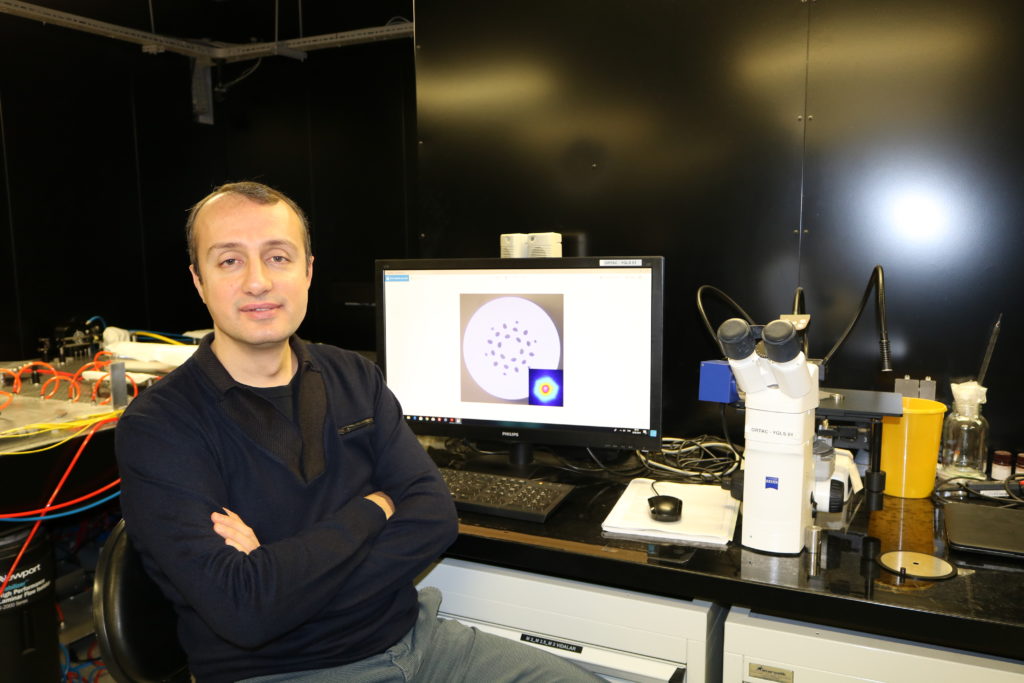Principal Investigator

Biography
Dr. Bülend Ortaç received the B. S. degree in Physics from the Karadeniz Technical University, Trabzon, Turkey, in 1997, M. S. degree in Teaching and Diffusion of Sciences and Technology from ENS Cachan University, Paris, France, in 2000, and Ph. D. degree in Optoelectronics from Rouen University, Rouen, France, in 2004 respectively. In Mach 2005, he joined the Institute of Applied Physics, Friedrich-Schiller University, Jena, Germany, as a Post-Doctoral Associate. Since November 2009, he has been working as a research assistant professor at Institute of Materials Science and Nanotechnology, Bilkent University.
He is the founder and principle investigator of the Laser Research Laboratory. His current research interests include the development of powerful fiber lasers in the continuous-wave regime to pulsed regime (ns, ps and fs) and the demonstration of laser systems for real world applications. He has published more than 100 research articles in major peer-reviewed scientific journals (over 50) and conferences (over 90) in the field of laser physics.
Publications: Google Scholar
Education
2004
Rouen University, Rouen, France.
Ph.D. in Optoelectronics, Optics and Optronics Group – CORIA UMR 6614 CNRS.
Thesis Title: Development of femtosecond ytterbium-doped double-clad fiber laser and characterization of multiple pulsing regimes.
Advisor: Professor Marc Brunel. December, 2004.
2000
ENS Cachan University, Paris, France.
M.S. in Teaching and Diffusion of Sciences and Technology, Laboratory Interacademic of Research on Scientific and Technological Education.
Thesis Title: Compared descriptive study of the steps of introduction of knowledge into handbooks.
Advisor: Professor Anne-Marie Huynen.
1997
Karadeniz Technical University, Trabzon, Turkey.
B.S. in Physics, Faculty of Science and Letters, Physics Department.
Project work: Study of the laws of probability and analyzes data.
Advisor: Professor Hakan Yılmaz.
1997
Karadeniz Technical University, Trabzon, Turkey.
Aggregation in Physical Science, Physics Education Department.
1993
High School, Kabataş Erkek Lisesi Istanbul, Turkey.
Awards & Honors
| 2014 | The Turkish Scientific and Technical Research Council (TUBITAK) Award. |
| 2014 | The Young Scientist (GEBİP) Award. |
| 2014 | Distinguished Young Scientist (BAGEP) Award. |
| 2014 | METU Prof. Dr. Mustafa Parlar Foundation Research Incentive Award. |
| 2011 | Feyzi Akkaya Foundation (FABED) Eser Tümen Young Scientist Award. |
| 2005- 2009 | Postdoctoral Fellowship, Institute of Applied Physics (Friedrich-Schiller University, Jena, Germany). |
| 2004 | Research Fellowship, CORIA UMR 6614 CNRS (Rouen University, Rouen, France) three months. |
| 1999- 2004 | Graduate Scholarship, Republic of Turkey, Ministry of National Education |
| 1998- 1999 | FKM Intensive French Course Scholarship, Republic of Turkey, Ministry of National Education, 14 months. |
| 1997 | Graduated with Honors from the Physics Department at Karadeniz Technical University. |
| 1996 | Honors student at Karadeniz Technical University. |
Professional Activities
| Membership | Optical Society of America |
| Paper review | Applied Physics B: Lasers and Optics IEEE Journal of Quantum Electronics IEEE Photonics Technology Letters Optics Communications Optics Express Optics Letters |
Research Interests
| Nonlinear Optics Ultrafast laser physics Fiber optic concepts CW and pulsed laser |
| Amplification systems |
| Combining of laser systems |
| Laser interactions and applications |
| Nanomaterials generation |
Research Experience
2005 – 2009
Institute of Applied Physics, Friedrich-Schiller University, Jena, Germany
Project work: Development of fiber-based ultrashort pulse oscillators and Chirped-pulse amplification systems based on fibers
Pulsed fiber laser
- Ultra-short pulse generation
- Experimentally and numerically study of fiber laser
- Fiber concepts (single-mode, double-clad, large-mode-area)
- Cavity designs (linear, ring, sigma)
- Mode-locked regimes (soliton, stretched, wave-breaking-free, dispersion compensation free, chirped pulse)
- Saturable absorbers (Kerr-, semiconductor- and carbon nanotubes-based saturable absorbers)
- Environmentally-stable femtosecond fiber laser
- Ultra-short pulse fiber amplifier
- Direct amplification of parabolic pulses in LMA fibers
- Chirped-pulse amplification system based LMA fibers
- Optical parametric chirped-pulse amplification
CW fiber lasers – Combining of fiber lasers
- Spectral beam combining of CW fiber lasers
- Spectral beam combining of pulsed fiber lasers
Scientific and industrial application of powerful fiber laser systems
- Material processing
- Ophthalmology
- Thz generation
2000 – 2004
Optoelectronics, Optics and Optronics Group – CORIA UMR 6614 CNRS, Rouen University, Rouen, France
Development of high-power femtosecond fiber oscillator
- High-power Yb-doped double-clad femtosecond fiber lasers
- Ultra-short high-power stretched-pulse Yb-doped double-clad fiber laser
- Self-similar low-noise femtosecond Yb-doped double-clad fiber laser
- Bound state generation
- High-repetition rate femtosecond fiber laser
Stimulated Brillouin scattering in fiber laser
Passively Q-switched fiber laser
Optical limiting
1999 – 2000
Teaching and Diffusion of Sciences and Technology, Laboratory Interacademic of Research on Scientific and Technological Education, ENS Cachan University, Paris, France
Study of the steps of introduction of knowledge
Locate the levels of knowledge
Analyze the construction of knowledge into handbooks
